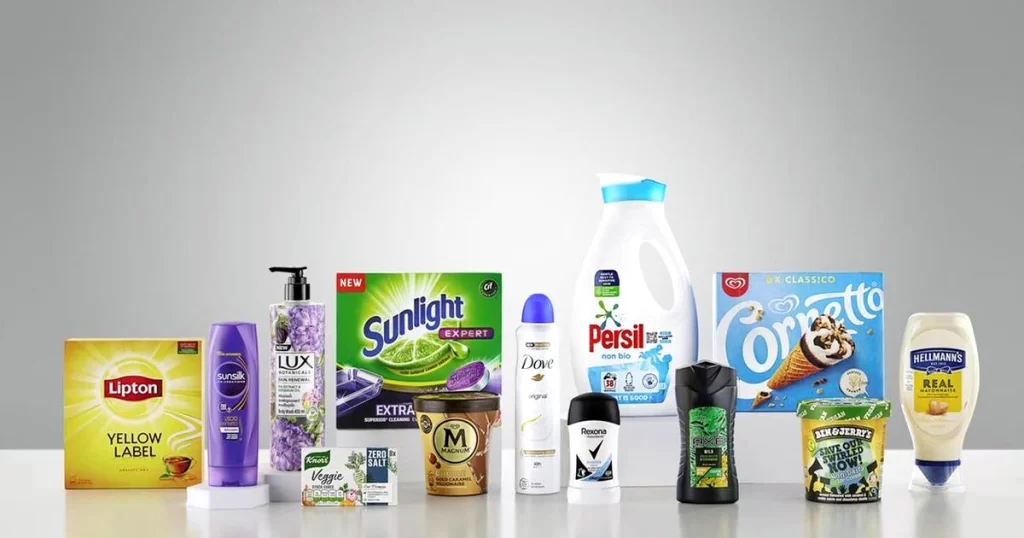Introduction to Unilever’s Sustainability Vision
Unilever, a global leader in consumer goods, has been a pioneer in driving sustainable practices and developing Eco-Friendly Products. The company’s long-standing commitment to reducing its environmental impact is deeply embedded in its business strategy. Unilever aims to make sustainable living commonplace by balancing growth with environmental and social responsibility.
In an era where environmental consciousness shapes consumer choices, Unilever stands out with its innovative green products and eco-friendly initiatives. This case study explores Unilever’s strategic focus, initiatives, and results in the domain of sustainability and Eco-Friendly Products, highlighting its role as a benchmark for other global corporations.
Unilever’s Sustainability Goals and Commitments
Unilever’s sustainability strategy revolves around the Unilever Sustainable Living Plan (USLP), which emphasizes reducing environmental footprint, enhancing community well-being, and fostering inclusive growth.
Key Focus Areas:
- Reducing Environmental Impact: Minimize greenhouse gas emissions, water consumption, and waste production.
- Sustainable Sourcing: Ensure raw materials are ethically and sustainably sourced.
- Innovative Products: Introduce biodegradable and eco-friendly packaging across all product lines.
Achievements So Far:
| Metric | Target | Progress |
|---|---|---|
| Carbon Emission Reduction | 50% by 2030 | 35% Achieved |
| Plastic Reduction | 50% by 2025 | 30% Achieved |
| Renewable Energy Usage | 100% by 2030 | 80% Achieved |
| Water Usage Efficiency | 40% Improvement | 25% Achieved |
Eco-Friendly Products: Innovation and Impact
Unilever has positioned itself as a leader in the development of Eco-Friendly Products, leveraging innovation, technology, and sustainable practices. Its product range not only prioritizes environmental responsibility but also ensures performance, affordability, and accessibility for global consumers. By focusing on eco-friendly packaging solutions, sustainable raw materials, and transparent supply chains, Unilever has redefined the consumer goods industry’s approach to sustainability.
Sustainable Product Innovation
Unilever’s commitment to innovation in Eco-Friendly Products spans multiple categories, including personal care, household cleaning, and food products. Each product line is designed with a focus on minimizing environmental impact without compromising quality.
Key Innovations Include:
- Plant-Based Formulations: Use of biodegradable, natural ingredients in cleaning and personal care products.
- Water-Saving Solutions: Concentrated formulas requiring less water during usage and production.
- Reduced Chemical Footprint: Phasing out harmful chemicals and replacing them with safer, eco-friendly alternatives.
Leading Sustainable Brands Under Unilever
Unilever’s sustainability initiatives are well-represented across its diverse brand portfolio:
| Brand Name | Key Sustainability Initiative | Impact |
|---|---|---|
| Seventh Generation | Plant-based, biodegradable cleaning products | 100% bio-based formulas |
| Love Beauty and Planet | Recycled and recyclable plastic packaging | 100% recyclable bottles |
| Dove | Refillable packaging solutions | 80% reduction in plastic usage |
| Ben & Jerry’s | Carbon-neutral dairy sourcing | 100% carbon offset achieved |
These brands not only meet customer demands for green products but also set a benchmark for responsible corporate practices.
Eco-Friendly Packaging Solutions
Packaging waste remains one of the most pressing environmental challenges. Unilever has introduced a series of eco-friendly packaging solutions aimed at minimizing waste and promoting circular economy practices.
- Recyclable Packaging: 80% of Unilever’s packaging materials are now recyclable, reusable, or compostable.
- Refillable Products: Products like Dove’s refillable deodorants reduce single-use plastic waste significantly.
- Material Innovation: Research into biodegradable plastics and algae-based packaging solutions is ongoing.
Responsible Sourcing and Transparent Supply Chains
Unilever’s sustainability journey extends beyond product design and packaging to include responsible sourcing and ethical supply chain management.
- Certified Raw Materials: 95% of palm oil, tea, and cocoa used in Unilever products are sustainably sourced.
- Supplier Audits: Regular audits ensure compliance with global sustainability standards.
- Local Partnerships: Collaboration with smallholder farmers and cooperatives to ensure ethical sourcing practices.
These measures ensure that every stage of the product lifecycle—from raw material extraction to final packaging—is aligned with the company’s sustainability goals.
Environmental and Social Impact of Eco-Friendly Products
The introduction of Eco-Friendly Products has delivered measurable outcomes for both the environment and local communities.
Key Achievements Include:
- Carbon Emission Reduction: Significant drop in greenhouse gas emissions across production facilities.
- Plastic Waste Minimization: Reduction in single-use plastics across major product lines.
- Improved Water Efficiency: Lower water usage during product manufacturing processes.
- Empowerment Programs: Enhanced income and training for farmers involved in the supply chain.
Consumer Adoption of Eco-Friendly Products
Consumer behavior is shifting towards sustainability, with individuals increasingly favoring Eco-Friendly Products that align with their environmental values. Unilever has successfully tapped into this growing demand by offering products that combine sustainability, quality, and affordability.
The company understands that adoption relies not just on product availability but also on consumer education and trust. Through innovative marketing campaigns and transparent communication, Unilever has positioned itself as a trusted leader in the eco-friendly market.
Changing Consumer Preferences
Modern consumers are not just looking for products—they are looking for brands that align with their personal values. Unilever has observed a significant increase in demand for green products across key markets.
Key Consumer Trends:
- Preference for products with clear sustainability labels.
- Willingness to pay a premium for verified eco-friendly products.
- Higher trust in brands that provide transparent information about sourcing and environmental impact.
Consumer Education Initiatives
Unilever has launched targeted campaigns to educate consumers on how to live a sustainable lifestyle and make responsible purchasing decisions.
Major Campaigns Include:
- “Clean Future Program” – Promotes the benefits of sustainable cleaning solutions.
- “Less Plastic, Better Future” – Encourages reducing single-use plastics through refillable packaging.
- “Small Actions, Big Change” – Educates consumers on simple habits for sustainable living.
These initiatives not only build awareness but also empower consumers to make informed choices.
Consumer Behavior Insights
Unilever continuously monitors consumer behavior to fine-tune its sustainability strategies and enhance customer engagement.
| Behavioral Metric | Observation |
|---|---|
| Preference for Sustainable Brands | Increased by 35% |
| Consumer Loyalty to Eco Brands | Improved by 25% |
| Participation in Sustainability Campaigns | Over 1 Million People |
These insights highlight the growing importance of sustainability in consumer decision-making.
Key Adoption Drivers
- Product Accessibility: Availability of affordable sustainable clothing brands and personal care products.
- Clear Labeling: Transparent communication about ingredients and environmental certifications.
- Positive Brand Perception: Strong association of Unilever brands with sustainability and environmental responsibility.
The Role of Digital Platforms
Digital platforms have played a crucial role in driving consumer adoption of Eco-Friendly Products. Unilever leverages social media, e-commerce channels, and mobile apps to reach wider audiences and educate them about sustainable choices.
- Social Media Campaigns: Amplify awareness about eco-friendly initiatives.
- E-commerce Partnerships: Ensure availability of Eco-Friendly Products across online platforms.
- Consumer Feedback Mechanisms: Encourage customers to share their sustainability experiences.
Competitive Landscape
The market for Eco-Friendly Products is becoming increasingly competitive as global brands recognize the growing demand for sustainability. Companies across industries are now embedding eco-friendly practices into their operations, from raw material sourcing to product design and packaging. Unilever operates in a space where competitors are equally committed to sustainability, innovation, and market leadership.
To stay ahead, Unilever leverages its first-mover advantage, strong brand portfolio, and deep integration of sustainable development principles into its business strategy.
Key Competitors in the Eco-Friendly Market
Several global giants have emerged as strong competitors in the Eco-Friendly Products segment:
- Procter & Gamble (P&G): Known for sustainable packaging and water-efficient products across its home care and personal care lines.
- Nestlé: Focuses on carbon neutrality and recyclable packaging across its food and beverage products.
- Johnson & Johnson: Prioritizes environmentally responsible healthcare and personal care products.
- Colgate-Palmolive: Leading initiatives in sustainable oral care products and zero-waste manufacturing processes.
Each competitor brings unique strengths to the table, creating a highly dynamic competitive landscape.
Unilever’s Competitive Advantages
Despite the growing competition, Unilever has maintained a leadership position in the Eco-Friendly Products market due to its strategic strengths:
- Diverse Brand Portfolio: Wide range of sustainable brands like Dove, Seventh Generation, and Love Beauty and Planet.
- Innovation Leadership: Continuous investment in eco-friendly packaging solutions and product reformulations.
- Global Reach: Strong presence across both developed and emerging markets.
- Transparency: Regular sustainability reporting builds trust with consumers and investors.
These factors collectively strengthen Unilever’s position in the global sustainability race.
Comparative Overview of Market Players
| Company | Key Focus Area | Strength |
|---|---|---|
| Unilever | Eco-Friendly Products | Innovation in sustainable packaging |
| Procter & Gamble | Water Efficiency | Strong global distribution network |
| Nestlé | Carbon Neutrality | Leadership in sustainable food systems |
| Johnson & Johnson | Sustainable Healthcare | Focus on eco-friendly healthcare products |
| Colgate-Palmolive | Zero-Waste Factories | Strong presence in oral care sustainability |
This comparison highlights the key differentiators among industry leaders and showcases how each company approaches sustainability.
Market Trends Influencing Competition
The competitive dynamics in the Eco-Friendly Products segment are shaped by evolving trends:
- Consumer Demand for Transparency: Brands are under pressure to provide verifiable claims about their sustainability practices.
- Innovation in Sustainable Materials: Research into biodegradable and plant-based materials is a major area of focus.
- Regulatory Pressures: Governments worldwide are imposing stricter regulations on environmental practices.
- E-Commerce Growth: Online platforms have become critical for the distribution of green products.
Strategic Partnerships as a Differentiator
Unilever actively engages in partnerships with governments, NGOs, and technology providers to drive sustainability goals:
- Collaborations with Fair Trade organizations for ethical raw material sourcing.
- Partnerships with packaging innovators for advanced eco-friendly packaging solutions.
- Joint initiatives with environmental advocacy groups to address global sustainability challenges.
These collaborations not only enhance Unilever’s capabilities but also strengthen its competitive edge.
Results of Sustainability Initiatives
Unilever’s commitment to sustainability and the development of Eco-Friendly Products has delivered measurable results across environmental, social, and economic dimensions. The company’s focus on reducing waste, promoting sustainable sourcing, and engaging consumers in responsible consumption has resulted in significant progress toward its sustainability goals.
These outcomes not only demonstrate Unilever’s dedication to environmental stewardship but also underline the business benefits of integrating sustainability into corporate strategy.
Environmental Impact
Unilever has made substantial progress in minimizing its environmental footprint through targeted sustainability initiatives.
Unilever’s Sustainability Metrics (2021-2023)
Over the years 2021 to 2023, Unilever has consistently prioritized environmental sustainability across critical metrics. The company achieved a remarkable 74% reduction in GHG emissions by 2023 compared to a 2015 baseline, underscoring its focus on renewable energy and efficient manufacturing processes. Sustainable sourcing of key crops remained a priority, with performance fluctuating slightly around the 79–81% range. Progress in plastic reduction showed a steady improvement, achieving an 18% reduction in virgin plastic usage by 2023 compared to 2019 levels. However, reusable, recyclable, and compostable plastic packaging plateaued at 53%, reflecting the persistent challenges in scaling circular packaging systems. These results demonstrate Unilever’s resilience in addressing environmental challenges while adapting to evolving global priorities.
Social Impact
Unilever’s initiatives extend beyond environmental goals to make a positive difference in communities worldwide.
Key Social Achievements:
- Empowered over 2.5 million women through social empowerment programs.
- Improved livelihoods for over 1 million smallholder farmers through sustainable sourcing initiatives.
- Provided hygiene and sanitation products to over 1 billion people globally.
These initiatives reflect Unilever’s dedication to improving lives while advancing social equity.
Unilever’s Eco-Friendly Product Goals Progress
Unilever’s commitment to environmental sustainability is reflected in its measurable achievements in 2023. The company ensured that 97.5% of its supply chain for critical raw materials, including palm oil, tea, and soy, was deforestation-free, demonstrating significant progress in ethical and transparent sourcing. Additionally, 79% of key agricultural crops were sustainably sourced, aligning with Unilever’s long-term environmental goals. These efforts underscore the company’s dedication to building a resilient and responsible supply chain while minimizing its environmental footprint.
In the area of packaging, 22% of plastic materials used were recycled, showcasing advancements in circular packaging systems. Furthermore, Unilever achieved an 18% reduction in virgin plastic usage compared to the 2019 baseline, reflecting ongoing efforts to minimize plastic dependency. These milestones highlight Unilever’s balanced approach to environmental stewardship while maintaining operational excellence and addressing global sustainability challenges head-on.
Key Drivers Behind Results
Unilever’s sustainability achievements have been driven by several strategic factors:
- Innovation in Eco-Friendly Products: Development of sustainable and biodegradable formulations.
- Investment in Renewable Energy: Transition to solar, wind, and other clean energy sources.
- Consumer Engagement Programs: Campaigns focusing on sustainable consumption habits.
- Transparent Reporting: Regular updates on sustainability progress foster stakeholder trust.
Recognition and Awards
Unilever’s efforts have been recognized globally through various awards and certifications:
- Dow Jones Sustainability Index: Consistently ranked among top sustainable corporations.
- CDP (Carbon Disclosure Project): Rated A for climate action transparency.
- UN Global Compact LEAD Status: Recognized for leadership in sustainability practices.
These accolades reinforce Unilever’s position as a global leader in Eco-Friendly Products and sustainable corporate practices.
Challenges Faced by Unilever in Sustainability Efforts
- Cost Constraints: Higher costs associated with sustainable raw materials and technologies.
- Market Perception: Price-sensitive consumers may perceive eco-friendly products as expensive.
- Global Supply Chain Complexity: Ensuring consistent compliance across regions is resource-intensive.
- Regulatory Challenges: Evolving sustainability regulations across markets require agile adaptation.
Future Roadmap for Eco-Friendly Products
Investment in Green Technology:
Unilever continues to prioritize investment in green technology as a key driver for sustainable growth. The company is actively exploring bio-based packaging materials to reduce reliance on conventional plastics and minimize environmental impact. Additionally, Unilever is expanding its refillable packaging options, enabling consumers to reduce waste and participate in circular economy practices.
Collaboration and Partnerships:
In the area of collaboration and partnerships, Unilever works closely with NGOs to address environmental challenges on a global scale. These partnerships facilitate knowledge-sharing, resource mobilization, and joint action plans for tackling critical issues such as waste management and carbon emissions. Simultaneously, the company is strengthening alliances with suppliers to ensure sustainable raw material sourcing, fostering accountability and transparency across the supply chain.
Expansion in Emerging Markets:
Recognizing the growth potential in emerging markets, Unilever is focusing on affordability as a key factor to drive adoption of Eco-Friendly Products. The company is also actively launching educational campaigns to raise awareness among rural consumers about sustainable living practices, empowering them to make environmentally responsible choices in their daily lives.
Conclusion
Unilever’s commitment to Eco-Friendly Products demonstrates how corporations can drive profitability while addressing global environmental concerns. Through initiatives like sustainable development, eco-friendly packaging solutions, and the promotion of green products, Unilever continues to lead the way in responsible business practices.
Lessons for Other Businesses
- Innovation is Crucial: Sustainable growth requires continuous innovation.
- Educate Consumers: Knowledge about how to live a sustainable lifestyle can drive better adoption.
- Transparency Builds Trust: Clear communication enhances consumer confidence.
Unilever’s success story serves as a blueprint for other corporations aiming to balance growth with environmental stewardship.




